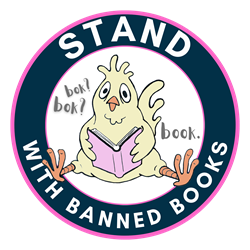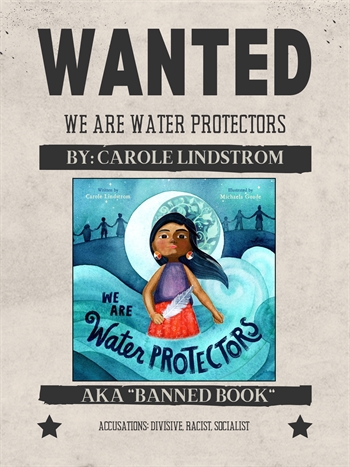March 2025 | Volume XLIII, Issue 1 »
Banned Books Café
March 3, 2025
Penny Blubaugh, Katherine Danko, & Marisa Bernstein, Eisenhower Public Library District
With the rise of book bans spreading throughout the country, the annual American Library Association’s (ALA) Banned Books Week campaign has gained increasing importance. Every year since ALA started Banned Books Week in 1982, the Eisenhower Public Library District has honored the campaign by creating displays, handing out materials like bookmarks and buttons, and trying to increase awareness of book bans both past and present. We also make it a point to encourage everyone to read titles and stories that speak to them. But as book bans flared up around the country, particularly during the years of the pandemic, we decided we needed to do even more. In 2023, we opened a Banned Books Café.

During Banned Books Week 2023 we spent our mornings from 10:00-12:00 serving coffee, cookies, and banned books. We handed out buttons, postcards patrons could use to write to their legislators, bookmarks, and ALA’s banned book data and Field Reports. We stamped their postcards and offered to mail them. Each book we were giving away had a Wild West-style “Wanted” poster with the reasons for its banning, along with display copies of the books for browsing.
We wanted to show the breadth of bans occurring across the country. To do this we made sure that our giveaways included YA and juvenile titles, as well as adult fiction and nonfiction. We started the week with nine titles—five copies of each. They included:
- Drama by Raina Telgemeier (Juvenile, YA) (Stonewall honorbook and Best Book 2012 from Publishers Weekly and others) This graphic novel about a group of drama students was banned repeatedly in Texas for a crush between two male friends.
- A Clockwork Orange by Anthony Burgess (Adult Fiction) (One of 100 best English language novels from Time and Modern Library) A dystopian view of youth culture that lands on ALA’s 100 Most Challenged List, often for “objectionable language.” Banned in Utah, Colorado, Connecticut, Alabama, and Florida.
- Maus by Art Spiegelman (YA, Adult) (Winner of the Eisner Award, Pulitzer Prize, and LA Times fiction award) Another graphic novel, this one depicting the Holocaust through the eyes of mice and cats. Listed as being removed in Tennessee because of profanity, violence, nudity, and a depiction of suicide.
- And Tango Makes Three by Peter Parnell and Justin Richardson (Picture Book) (ALA Notable Children’s Books Nominee, a Bank Street Best Book, ASPCA Award) Two male penguins raise a baby penguin together. One of the most banned books in the country, including in Florida and California, said to be unsuitable for younger children because of “homosexual overtones.”
- The Glass Castle: A Memoir by Jeannette Walls (Adult Nonfiction) (Alex Award, Christopher Award, Books for Better Living Award) A memoir recounting the author’s dysfunctional and often homeless upbringing. Banned in Wisconsin and Michigan for sexual content and offensive language.
- Fun Home by Alison Bechdel (Adult Nonfiction) (A New York Times bestseller that won the Stonewall Award and Eisner Award) The reasons for banning this graphic memoir in Missouri, Utah, New Jersey, South Dakota, and Wisconsin are listed as pornography and the promotion of a gay and lesbian lifestyle.
- Nickel and Dimed: On Not Getting By in America by Barbara Ehrenreich (Adult Nonfiction) (YALSA Outstanding Books for the College Bound, Laanan Award, Erasmus Award) A true story of the author working a series of low-wage jobs to show the effects of capitalism. Banned in Pennsylvania, Kansas, and North Carolina for promoting socialism, belittling Christians, and promoting drug use.
- The Adventures of Captain Underpants by Dav Pilkey (Juvenile) (Buckeye Award, Kids’ Choice Book Award, Garden State Children’s Book Award) A graphic novel about two fourth grade boys doing what fourth grade boys do; listed as being banned in Iowa for violent imagery.
We also highlighted The Carnival at Bray by Jessie Ann Foley, a local author. This YA novel was shortlisted for both ALA’s Printz and Morris awards. It’s the story of a girl coming of age in Ireland and was banned in Tennessee, Utah, Florida, South Carolina, and Iowa for having “pornographic” material. Unfortunately, this title wasn’t included in our giveaways because it was no longer in print. While there were eBook and eAudio copies available, not everyone has access to those formats. We were able to find a used copy in good condition, but for a Foley giveaway we used her newest book, Breda’s Island. (In the good news department The Carnival at Bray has been reissued by Quill Tree Books, an imprint of HarperCollins.)
We capped the week with an in-person visit from Foley. She spent an hour chatting with patrons about the effects of book banning and censorship. This was especially compelling because she’s a high school English teacher who has seen the consequences of book bans for both her students and herself, as well as students around the country. We gave our one precious copy of The Carnival at Bray away in a random drawing.
By the end of the week we had given away all of our books, (44 in total) minus one copy of Drama. Our café drop-in attendees were all positive about the event. We had conversations on book banning in general and dialogues about why we’d chosen our titles for giveaways. We mailed out postcards, people took all of our ALA Field Reports, and the stickers we’d made turned out to be a big hit.

Yessenia Carrillo, Eisenhower Public Library
For 2024, we expanded the program. We still had our coffee and cookies every day during Banned Books Week, and we still had all our giveaways, including our books with their “Wanted” posters. However, we stayed open an hour longer each day, and this time we had 11 titles. They included:
- We Are Water Protectors by Carole Lindstrom (Picture Book) (Caldecott Winner) A First Nations look at why the world needs to protect its water. Banned in Pennsylvania and Michigan for being divisive, racist, and socialist.
- Wishtree by Katherine Applegate (Juvenile) (NPR, Publishers Weekly, and New York Times Best Book) A story about a monoecious red oak—a tree with both male and female reproductive parts—that is willing to use any pronoun. Banned in Virginia for indoctrination.
- Bone by Jeff Smith (Graphic Novel) (Eisner Award) The Bone cousins are transported from their world to a new place unlike anything they’ve known. Banned in New Mexico, Minnesota, and Texas for violence, racism, and political viewpoint.
- Mr. Watson’s Chickens by Jarrett Dapier (Picture Book) (NPR Best Book, JLG selection) A book about a gay couple who own chickens. Banned in Illinois and Alabama.
- Of Mice and Men by John Steinbeck (Classic) (BBC Best Loved Novel, Book of the Month Club) A novella set during the Depression. Banned in Tennessee, Massachusetts, Idaho, Missouri, and Minnesota for vulgarity, racism, treatment of women, racial slurs, and negative effects on students.
- In Cold Blood by Truman Capote (True Crime) (Edgar Award) A nonfiction murder novel banned for violence, sex, and profanity in California and Georgia.
- The Hill We Climb by Amanda Gorman (Poetry) (Biden’s inauguration poem) Banned in Florida for hate messages, critical race theory, and not being educational.
- Love in the Library by Maggie Tokuda-Hall (Picture Book) (Stars from Booklist, Publishers Weekly, School Library Journal) Scholastic, based in New York, asked the author to leave out her note at the end citing the atrocity of the creation of Japanese incarceration camps.
- Alice’s Adventures in Wonderland by Lewis Carroll (Classic) (Critical praise in the 1900s.) Banned in the United States for encouraging the evolving drug culture with its “overt” allusions to hallucinogenic drug use.
- The Henna Wars by Adiba Jaigirdar (Young Adult) (Time's 100 Best Young Adult Books) This story of a Bangladeshi teen coming out in high school was banned in Tennessee for LGBTQ+ themes, lesbian portrayals, religious minority characters, and Islamic themes.
- I Am Not Your Perfect Mexican Daughter by Erika Sanchez (Young Adult) (National Book Award finalist) The story of Julia growing up in Chicago was banned in Texas for strong language and a negative portrayal of religious faith.
We hosted 80 walk-ins and gave away all of our books, except for one copy of Of Mice and Men (65 giveaways). We created a map of the United States with color-coded pins plugged into states where our chosen titles were banned. It made an interesting visual display because you could see where books had been banned across the country, coast-to-coast, and across the political spectrum.
For our author visit, we invited Jarrett Dapier, who wrote Mr. Watson’s Chickens. This charming book is about Mr. Watson and Mr. Nelson and their chickens. Those chickens multiplied until Mr. Nelson threatened to move out, and Mr. Watson knew that as much as he “loved his chickens, he loved Mr. Nelson more.” This line seemed to be the bone of contention that ignited several bans, including a loss of speaking engagements in Illinois and, in Shelby, Alabama, the firing of a library board, a director, and a loss of library staff. Dapier, a librarian himself, also spoke about the support he received from Spanish Fork, Alabama. There, the book was challenged but stayed on the shelf when people showed up en masse saying they wanted to keep the book right where it was.
One of our favorite comments at the end of his presentation was from a woman who told us how angry she was about the entire book banning trend. Several other patrons, including one of our board members, commented on how much they’d learned.
The Banned Books Café is an infinitely customizable program that could work in a library of any size, and at any price point. You could buy just one copy of each book and do a random raffle as we did with The Carnival at Bray. You could open for just one day, or expand the hours. You could add more titles, or more copies of your chosen books. You could also host your café in conjunction with your library-wide Banned Books Week displays.
Engage your patrons with books, but don’t forget the coffee and treats. Celebrate intellectual freedom and the First Amendment of the Constitution in whatever way best suits your community, but we recommend giving the Banned Books Café a try.

 iREAD Summer Reading Programs
iREAD Summer Reading Programs Latest Library JobLine Listings
Latest Library JobLine Listings